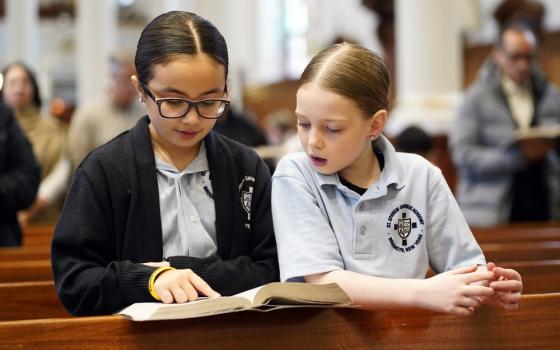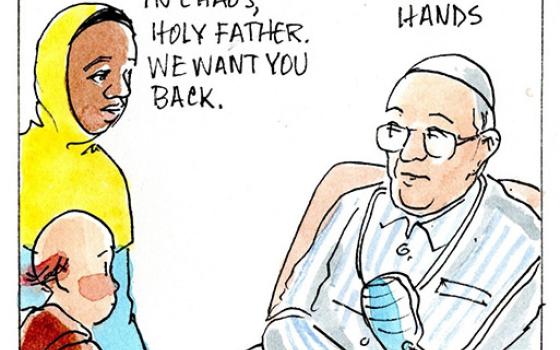By JOHN L. ALLEN JR.
Beirut
When popes hit the road, there’s often a notable contrast in which part of the church’s social message they stress, depending on which global neighborhood they’re in. In very broad strokes, the peace-and-justice stuff tends to loom largest in the developing world, while the pro-life message and the perils of secularism take pride of place in the West.
On his previous 23 foreign journeys, Benedict XVI largely had followed that pattern. It’s no accident that his most developed reflections on secularism have come in France, the U.K., and Germany, while some of his most fiery social rhetoric has come on outings to Brazil in 2007 and to Africa in both 2009 and 2011.
Today, however the pope broke that mold, instead offering a memorable phrase to express the idea that being pro-peace and pro-life is one organic whole: “If we want peace,” he said, “let’s defend life!”
Benedict may not exactly be a sound-bite machine, but there’s probably a bumper sticker there someplace.
(For the record, the phrase is not exactly new. Pope Paul VI’s message for the World Day of Peace in 1977 was titled, “If you want peace, defend life.” John Paul II used a slightly more complicated version of the same idea during a 1999 speech in St. Louis: “If you want peace, work for justice. If you want justice, defend life. It you want life, embrace the truth, the truth revealed by God.”)
Benedict’s argument came this morning during a speech in Lebanon’s Presidential Palace, described as a meeting with politicians, diplomats, religious leaders, and representatives of “the world of culture.” (Whenever the word “culture” appears on Benedict’s itinerary, it will probably occasion the speech he’s sweated over most – logically enough, perhaps, for a professor pope.)
The heart of the speech, delivered in French, was that justice and peace arise from a culture that respects human dignity – and dignity, in turn, depends upon respect for the sanctity of life, meaning defending both human life and the traditional family (which, in political terms, usually implies opposition to abortion and gay marriage.)
In other words, the pope was arguing that the peace-and-justice and pro-life teachings not only belong together, but they are codependent – you can’t have one without the other.
“The effectiveness of our commitment to peace depends on our understanding of human life,” the pope said. “Unconditional acknowledgement of the dignity of every human being, of each one of us, and of the sacredness of human life, is linked to the responsibility which we all have before God.”
That line of thought led Benedict to stress the family.
“A person comes into this world in a family, which is the first locus of humanization, and above all the first school of peace,” he said. “To build peace, we need to look to the family, supporting it and facilitating its task, and in this way promoting an overall culture of life.”
In slightly more technical form, Benedict argued that peace depends on a “sound anthropology” (that was the term in French and Italian, though in English “anthropology” became “vision of man”) – because, Benedict warned, “Wherever the truth of human nature is ignored or denied, it becomes impossible to respect that grammar which is the natural law inscribed in the human heart.”
“This approach leads us to reject not only war and terrorism, but every assault on innocent human life, on men and women as creatures willed by God,” he said.
The pope added that in today's world, that view of human dignity is not universally shared.
“By questioning, directly or indirectly, or even before the law, the inalienable value of each person and the natural foundation of the family, some ideologies undermine the foundations of society,” he said.
The pope went to on extol the quest for peace and “understanding between cultures and religions,” placing special stress on reconciliation and forgiveness.
The idea that the peace-and-justice and pro-life components of Catholic teaching belong together is hardly a novelty. It’s been said repeatedly by officialdom over the years, and it was in some ways the heart of Benedict’s own 2009 social encyclical, Caritas in Veritate. Still, it’s interesting that Lebanon would be where Benedict brings this organic social message into clearest focus outside of Rome.
Perhaps it’s because in some ways the Middle East, and Lebanon in particular, is where the West and the developing world intersect and overlap; in Beirut, you can listen to the muezzin, the Islamic call to prayer, while sitting at an outdoor café reading the Guardian and drinking a vodka tonic.
Perhaps it’s because Benedict sees the struggle against radical forms of secularism as the natural basis of an “alliance of civilizations” between Christianity and Islam, and the Middle East is thus a natural place to argue that being pro-peace and pro-life are intrinsically connected, before an audience he believes is inclined to be receptive.
Of course, it could be as simple as that this is just what was on Benedict’s mind when he sat down to contemplate his speeches in Beirut.
In any event, it’s striking that Benedict offered a blend of typically “Western” and “Third World” papal rhetoric here, in a country that prides itself on being a crossroads of cultures.
Benedict spoke after holding separate brief private sessions with the President, Prime Minister and Speaker of the Parliament – a Maronite Christian, Sunni Muslim and Shi’ite Muslim, according to the traditional distribution of leadership positions here.
Despite a thick security presence, including soldiers toting automatic weapons positioned every few feet, a large crowd turned out to greet the pope this morning as he arrived at the presidential palace. He took the Popemobile, and was escorted part of the way up the hill to the palace by a Lebanese cavalry corps, their horses alternately bearing the Lebanese and Vatican flags.
Welcoming the pope, Lebanese President Michel Sleiman, speaking in Arabic, said that the visit comes as a critical time for Lebanon, since “around us some stray towards the logic of violence and the dangers of sectarian and confessional fragmentation.”
The atmosphere in Beirut so far has remained calm and welcoming during Benedict's trip, despite an outbreak of anti-American violence and looting in Tripoli, roughly 45 minutes to the north, yesterday, and despite a demand from a radical Islamic cleric today that the pope apologize for "offending" Muslims with a 2006 speech in Germany that appeared to link Muhammad to violence.
Later this afternoon, Benedict is scheduled to speak at a large youth rally held at the headquarters of Lebanon's Maronite church.


